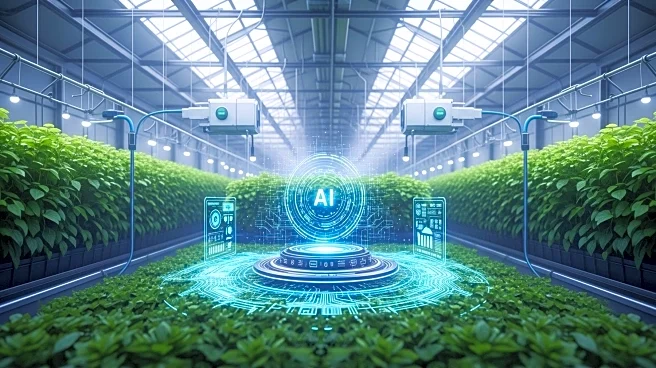What's Happening?
Instacrops, a startup focused on agricultural technology, is set to demonstrate its AI-driven solutions at TechCrunch Disrupt 2025 in San Francisco. Originally founded to deploy IoT sensors for frost warnings, Instacrops has pivoted to software solutions aimed at reducing water usage and increasing crop yields. The company now assists 260 farms in cutting water use by up to 30% and boosting crop yields by as much as 20%. Instacrops processes approximately 15 million data points per hour, a significant increase from a decade ago. The startup integrates with existing farm networks to provide irrigation advisories via mobile apps and WhatsApp, aiming to become a universal tool for farmers.
Why It's Important?
The integration of AI in agriculture is crucial for addressing global water scarcity and enhancing food production efficiency. Instacrops' technology offers a sustainable solution to reduce water consumption, which is vital as agriculture accounts for 70% of global freshwater use. By improving crop yields, the startup supports food security and economic stability in regions heavily reliant on agriculture. The use of AI in this sector can lead to cost reductions and increased productivity, benefiting farmers and contributing to environmental conservation efforts.
What's Next?
Instacrops plans to expand its use of WhatsApp for farmer advisories, aiming for full integration within the next year. The company will continue to focus on high-value crops in Latin America, such as apples and avocados, while exploring further technological advancements. Participation in TechCrunch Disrupt provides an opportunity for Instacrops to attract investment and partnerships, potentially accelerating its growth and impact in the agricultural sector.
Beyond the Headlines
The shift from hardware to AI-driven solutions reflects a broader trend in agriculture towards digital transformation. This evolution not only enhances operational efficiency but also raises questions about data privacy and the ethical use of AI in farming. As AI becomes more integrated into agricultural practices, stakeholders must address these concerns to ensure responsible and equitable technology deployment.









